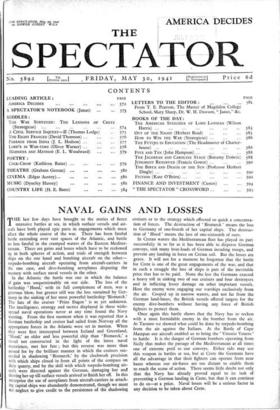NAVAL GAINS AND LOSSES T HE last few days have brought
us the stories of fierce I. intensive battles at sea, in which surface vessels and air- craft have both played epic parts in engagements which must affect the whole course of the war. There has been fateful battle extending over vast spaces of the Atlantic, and battle no less fateful in the cramped waters of the Eastern Mediter- ranean. There are gains and losses which have to be reckoned up in both spheres of action, and trials of strength between ships on the one hand and bombing aircraft on the other- torpedo-bombing aircraft operating from aircraft-carriers in the one case, and dive-bombing aeroplanes disputing the mastery with surface naval vessels in the other.
In the Atlantic the battle was one in which the balance of gain was unquestionably on our side. The loss of the battleship ' Hood,' with its full complement of men, was a grievous blow, but greater still was the loss sustained by Ger- many in the sinking of her most powerful battleship 'Bismarck.' The fate of the cruiser `Prinz Eugen ' is as yet unknown. The intelligence, strategy and tactics displayed in these wide- spread naval operations never at any time found the Navy wanting. From the first moment when it was reported that a German battleship and cruiser had sailed from Norway all the appropriate forces in the Atlantic were set in motion. When they were first intercepted between Iceland and Greenland, 'Hood,' an older and less powerful ship than ' Bismarck,' a vessel not constructed in the light of the latest naval experience, met her fate ; but this reverse was more than atoned for by the brilliant manner in which the cruisers suc- ceeded in shadowing ' Bismarck,' by the clockwork precision with which ships closed in from all points of the compass on their quarry, and by the skill with which torpedo-bombing air- craft were directed against the German, damaging her and slowing her up till surface vessels arrived to finish her off. In this enterprise the use of aeroplanes from aircraft-carriers in attack- ing capital ships was abundantly demonstrated, though we must not neglect to give credit to the persistence of the shadowing cruisers or to the strategy which ,effected so quick a concentra- tion of forces. The destruction of ' Bismarck ' means the loss to Germany of one-fourth of her capital ships. The destruc- tion of ' Hood ' means the loss of one-sixteenth of ours.
In Cretan waters the Mediterranean fleet has played its part successfully in so far as it has been able to disperse German convoys, sink many boat-loads of German invading troops, and prevent any landing in force on Cretan soil. But the losses are grave. It will not for a moment be forgotten that the battle for Crete is one of the great engagements of the war, and that in such a struggle the loss of ships is part of the inevitable price that has to be paid. None the less the Germans exacted a heavy toll in sinking two of our cruisers and four destroyers and in inflicting lesser damage on other imiltrtant vessels. Here the enemy were engaging our warships exclusively from the air. Cooped up in narrow waters, and not far from the German land-bases, the British vessels offered targets for the enemy dive-bombers without having any force of British fighters to protect them.
Once again this battle shows that the Navy has to reckon with a most formidable enemy in the bomber from the air. At Taranto we showed what could be done by torpedo-bombing from the air against the Italians. At the Battle of Cape Matapan our aircraft enabled us to bring the ' Vittorio Veneto' to battle. It is the danger of German bombers operating from Sicily that makes the passage of the Mediterranean at all times one of extreme peril to our convoys. Either side may use this weapon in battles at sea, but at Crete the Germans have all the advantage in that their fighters can operate from near bases whereas our air-bases are too distant to enable them to reach the scene of action. There seems little doubt not only that the Navy has already proved equal to its task of preventing a German landing in Crete, but that it can continue to do so—at a price. Naval losses will be a serious factor in any decision to be taken about Crete.






























